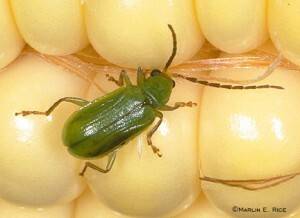 A systematic, diverse approach to corn rootworm management is needed if growers are to have successful corn-on-corn acres in the future, said Dr. Aaron Gassmann while presenting last month during the 25th Annual Integrated Crop Management Conference on the Iowa State University campus.
A systematic, diverse approach to corn rootworm management is needed if growers are to have successful corn-on-corn acres in the future, said Dr. Aaron Gassmann while presenting last month during the 25th Annual Integrated Crop Management Conference on the Iowa State University campus.
Since 2009, Dr. Gassmann has studied the use of Bt corn hybrids in Iowa. He says the number of fields showing severe rootworm injury has increased every year primarily due to the overuse of one specific trait on fields for many consecutive years, lack of refuge compliance, and lack of scouting for both larval rootworm and adult beetles.
Farms with continuous corn production, and specifically those fields planted to the same Bt event year-after-year, are most at-risk for developing a resistant population. To delay resistance, Dr. Gassman and his colleagues recommend the following IPM approaches:
- Rotate to soybeans or other crops to break the corn rootworm life cycle between growing seasons.
- Consider using corn that contains different Bt proteins than ones that may have performed poorly in the past.
- Consider using pyramided Bt hybrids, which is defined as corn that contains multiple Bt proteins targeting corn rootworm.
Implementing a long-term integrated approach to corn rootworm management is most important, according to Gassmann. Integration of tactics across seasons is fundamental to prolonging the usefulness of any effective management strategy
